German actress Fita Benkhoff (1901-1967) appeared in more than 100 films between 1933 and 1967. The vivacious, blonde actress specialised in supporting parts, often as the best friend, aunt or mother of the leading actress. Together with Grethe Weiser, she was seen as the main female comic sidekick of the German film, the equivalent of a German Eve Arden.
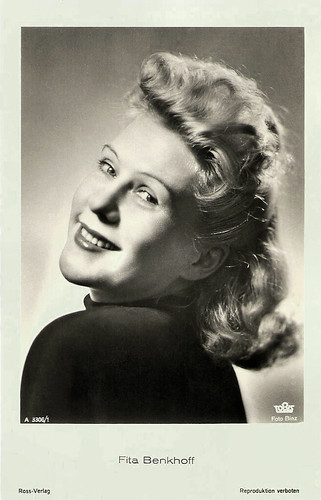
German postcard by Ross Verlag, no. A 3306/1, 1941-1944. Photo: Tobis / Tita Binz.
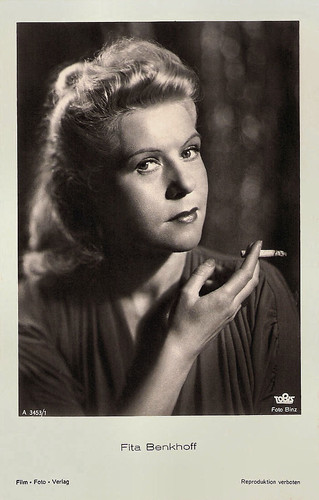
German postcard by Film-Foto-Verlag, no. A 3453/1, 1941-1944. Photo: Tobis / Tita Binz.
Frieda Elfriede ‘Fita’ Benkhoff was born in 1901 in Dortmund, Germany. She was the seventh of eight children by Christian Alex Gustav Benkhoff and his wife Maria Bernardine Marcus. Her parents managed the Walhalla, one of the biggest entertainment halls in Dortmund.
Fita worked as a dentist assistant and a telephone operator, but secretly she attended acting classes by Emil Bender. In 1924, she became a volunteer at the Stadtheater Dortmund and made her stage debut in Don Carlos. Several roles followed before she moved to theatres in Lübeck, Düsseldorf, Breslau and Wien.
She started her film career in 1933 with a part in Der streitbare Herr Kickel/The belligerent Mr. Kickel (Georg Jacoby, 1933) with Jacob Tiedtke. In 1934, she appeared in the popular film comedy Charleys Tante/Charley's Aunt (Robert A. Stemmle, 1934) starring Fritz Rasp and Paul Kemp. Other supporting parts she played in such comedies as Heinz im Mond/Heinz in the Moon (Robert A. Stemmle, 1934) starring Heinz Rühmann, and Krach um Jolanthe/Trouble with Jolanthe (Carl Froelich, 1934) featuring Marianne Hoppe.
A bigger role followed in the German musical Amphitryon (1935). Written and directed by Reinhold Schünzel, it is based on plays by Molière, Plautus, and Heinrich von Kleist, which in turn are based on Greek mythology. She established such a popular rapport with Paul Kemp in this comedy, that she was cast opposite him in further popular outings, including Boccaccio (Herbert Maisch, 1936), and, for once co-starring, in Der schüchterne Casanova/The Bashful Casanova (Karel Lamac, 1936).
In the comedy Lauter Lügen/All Lies (1938), she co-starred with Albert Matterstock, and Hertha Feiler. It was the directorial debut of Heinz Rühmann. At IMDb, I.S. Mowis writes: “Even though she rarely commanded a leading role, she was an effervescent, perpetually wisecracking scene stealer, who invariably had the last word, whether as friend of the heroine, gossipy aunt or nosy parker.” She played another of her few leading roles in the historical comedy Schneider Wibbel/Wibbel the Tailor (Viktor de Kowa, 1939) opposite Erich Ponto.
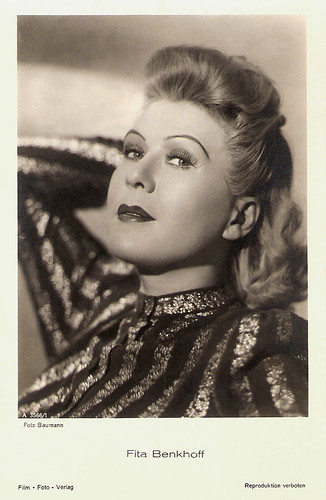
German postcard by Film-Foto-Verlag, no. A 3566/1, 1941-1944. Photo: Baumann.
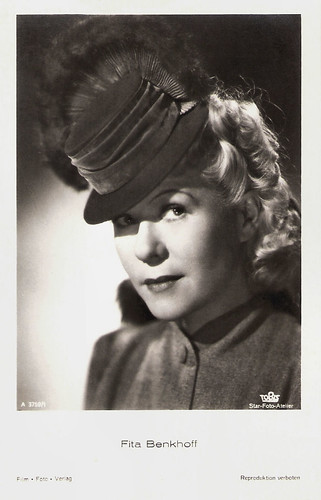
German postcard by Film-Foto-Verlag, no. A 3759/1, 1941-1944. Photo: Tobis / Star-Foto-Atelier.
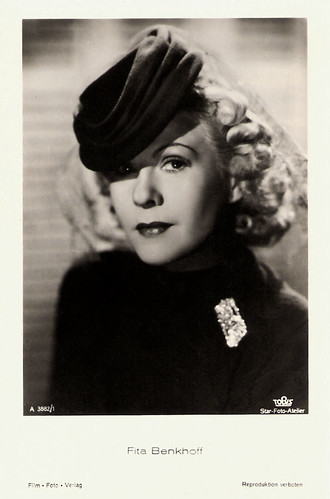
German postcard by Film-Foto-Verlag, no. A 3882/1, 1941-1944. Photo: Tobis / Star-Foto-Atelier.
Fita Benkhoff had another leading role next to Karl Schönböck in the comedy Ich hab’ von dir geträumt/I’ve dreamed of you (Wolfgang Staudte, 1944). Besides her film work, she played roles at the Volksbühne Berlin and at the Deutschen Theater. Here she portrayed Klara in Friedrich Hebbel’s Maria Magdalena which became her greatest stage success.
After the Second World War, she moved to Hamburg, where she performed at the Schauspielhaus. She also found new film roles. In 1949 she played Mother Wolff in the DEFA-production Der Biberpelz/The Beaver Coat (Erich Engel, 1949), an adaptation of Gerhart Hauptmann's play The Beaver Coat.
She soon returned to the comic genre and played a leading role in Drei Mädels vom Rhein/Three Girls from the Rhine (Georg Jacoby, 1955). Her other films include Pension Schöller (Georg Jacoby, 1952), Wenn abends die Heide träumt/When the Heath Dreams at Night (Paul Martin, 1952), Auf der Reeperbahn nachts um halb eins/On the Reeperbahn at Half Past Midnight (Wolfgang Liebeneiner, 1954) with Hans Albers, Raub der Sabinerinnen/The Abduction of the Sabine Women (Kurt Hoffmann, 1954) and Wenn der Vater mit dem Sohne/As the father with the son (Hans Quest, 1955) starring Heinz Rühmann.
Besides her film work, she continued to appear in the theatre, such as in Berlin at the Hebbel-Theater. After the death of her husband, the merchant Wilhelm Strom in 1957 she completely retired from public life. She lived in her house in München and started to paint. In 1967, she played a last role on stage in the black comedy Arsenic and Old Lace.
Fita Benkhoff died in Munich, West-Germany in 1967 at the age of 65.
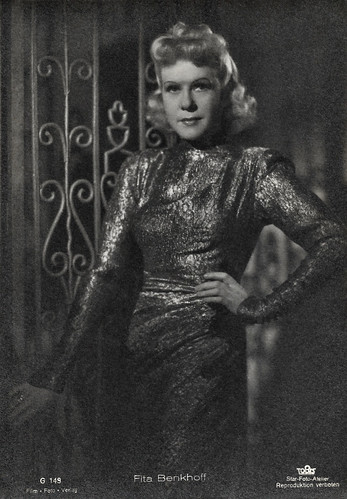
German postcard by Film-Foto-Verlag, no. G 148, 1941-1944. Photo: Tobis / Star-Foto-Atelier.
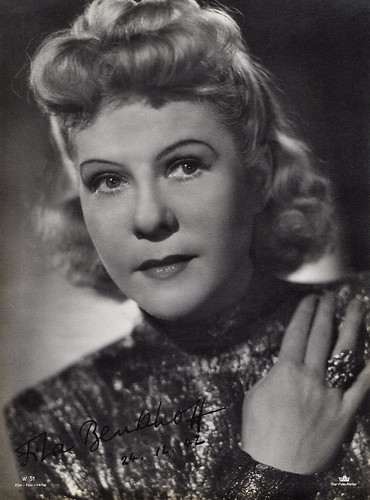
Big German card by Film-Foto-Verlag, no. W 51, 1941-1944. Photo: Tobis / Star-Foto-Atelier.

German postcard by Kunst und Bild, no. A 731. Photo: A. Grimm / Apollo / Deutsche London Film. Publicity still for Von Liebe reden wir später/We'll talk about love later (Karl Anton, 1953).
Sources: I.S. Mowis (IMDb), Wikipedia (German and English) and IMDb.

German postcard by Ross Verlag, no. A 3306/1, 1941-1944. Photo: Tobis / Tita Binz.

German postcard by Film-Foto-Verlag, no. A 3453/1, 1941-1944. Photo: Tobis / Tita Binz.
An effervescent, perpetually wisecracking scene stealer
Frieda Elfriede ‘Fita’ Benkhoff was born in 1901 in Dortmund, Germany. She was the seventh of eight children by Christian Alex Gustav Benkhoff and his wife Maria Bernardine Marcus. Her parents managed the Walhalla, one of the biggest entertainment halls in Dortmund.
Fita worked as a dentist assistant and a telephone operator, but secretly she attended acting classes by Emil Bender. In 1924, she became a volunteer at the Stadtheater Dortmund and made her stage debut in Don Carlos. Several roles followed before she moved to theatres in Lübeck, Düsseldorf, Breslau and Wien.
She started her film career in 1933 with a part in Der streitbare Herr Kickel/The belligerent Mr. Kickel (Georg Jacoby, 1933) with Jacob Tiedtke. In 1934, she appeared in the popular film comedy Charleys Tante/Charley's Aunt (Robert A. Stemmle, 1934) starring Fritz Rasp and Paul Kemp. Other supporting parts she played in such comedies as Heinz im Mond/Heinz in the Moon (Robert A. Stemmle, 1934) starring Heinz Rühmann, and Krach um Jolanthe/Trouble with Jolanthe (Carl Froelich, 1934) featuring Marianne Hoppe.
A bigger role followed in the German musical Amphitryon (1935). Written and directed by Reinhold Schünzel, it is based on plays by Molière, Plautus, and Heinrich von Kleist, which in turn are based on Greek mythology. She established such a popular rapport with Paul Kemp in this comedy, that she was cast opposite him in further popular outings, including Boccaccio (Herbert Maisch, 1936), and, for once co-starring, in Der schüchterne Casanova/The Bashful Casanova (Karel Lamac, 1936).
In the comedy Lauter Lügen/All Lies (1938), she co-starred with Albert Matterstock, and Hertha Feiler. It was the directorial debut of Heinz Rühmann. At IMDb, I.S. Mowis writes: “Even though she rarely commanded a leading role, she was an effervescent, perpetually wisecracking scene stealer, who invariably had the last word, whether as friend of the heroine, gossipy aunt or nosy parker.” She played another of her few leading roles in the historical comedy Schneider Wibbel/Wibbel the Tailor (Viktor de Kowa, 1939) opposite Erich Ponto.

German postcard by Film-Foto-Verlag, no. A 3566/1, 1941-1944. Photo: Baumann.

German postcard by Film-Foto-Verlag, no. A 3759/1, 1941-1944. Photo: Tobis / Star-Foto-Atelier.

German postcard by Film-Foto-Verlag, no. A 3882/1, 1941-1944. Photo: Tobis / Star-Foto-Atelier.
Completely retired from public life
Fita Benkhoff had another leading role next to Karl Schönböck in the comedy Ich hab’ von dir geträumt/I’ve dreamed of you (Wolfgang Staudte, 1944). Besides her film work, she played roles at the Volksbühne Berlin and at the Deutschen Theater. Here she portrayed Klara in Friedrich Hebbel’s Maria Magdalena which became her greatest stage success.
After the Second World War, she moved to Hamburg, where she performed at the Schauspielhaus. She also found new film roles. In 1949 she played Mother Wolff in the DEFA-production Der Biberpelz/The Beaver Coat (Erich Engel, 1949), an adaptation of Gerhart Hauptmann's play The Beaver Coat.
She soon returned to the comic genre and played a leading role in Drei Mädels vom Rhein/Three Girls from the Rhine (Georg Jacoby, 1955). Her other films include Pension Schöller (Georg Jacoby, 1952), Wenn abends die Heide träumt/When the Heath Dreams at Night (Paul Martin, 1952), Auf der Reeperbahn nachts um halb eins/On the Reeperbahn at Half Past Midnight (Wolfgang Liebeneiner, 1954) with Hans Albers, Raub der Sabinerinnen/The Abduction of the Sabine Women (Kurt Hoffmann, 1954) and Wenn der Vater mit dem Sohne/As the father with the son (Hans Quest, 1955) starring Heinz Rühmann.
Besides her film work, she continued to appear in the theatre, such as in Berlin at the Hebbel-Theater. After the death of her husband, the merchant Wilhelm Strom in 1957 she completely retired from public life. She lived in her house in München and started to paint. In 1967, she played a last role on stage in the black comedy Arsenic and Old Lace.
Fita Benkhoff died in Munich, West-Germany in 1967 at the age of 65.

German postcard by Film-Foto-Verlag, no. G 148, 1941-1944. Photo: Tobis / Star-Foto-Atelier.

Big German card by Film-Foto-Verlag, no. W 51, 1941-1944. Photo: Tobis / Star-Foto-Atelier.

German postcard by Kunst und Bild, no. A 731. Photo: A. Grimm / Apollo / Deutsche London Film. Publicity still for Von Liebe reden wir später/We'll talk about love later (Karl Anton, 1953).
Sources: I.S. Mowis (IMDb), Wikipedia (German and English) and IMDb.
No comments:
Post a Comment